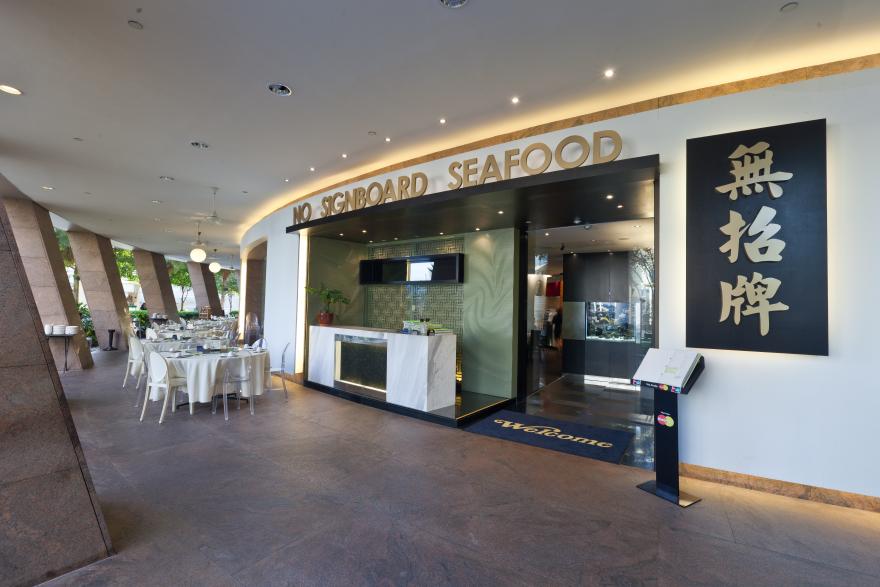TOP executives of beleaguered restaurant operator No Signboard on Wednesday (Mar 13) outlined their plans for the company in the near term.
These include the resumption of trading of shares in about a week and a six-to-one share consolidation.
Speaking at a dialogue organised by the Securities Investors Association (Singapore) or Sias, No Signboard’s interim chief executive Lim Teck-Ean referred to a bourse announcement on Mar 12 that the Singapore Exchange has not objected to the company’s trading resumption proposal, on the proviso that it meets a number of disclosures.
He said these conditions have been fulfilled by the company. In response to a question from Sias chief executive David Gerald on how soon the stock will resume trading, Lim said the company is looking to have the shares resume trading on the Singapore stock market by the next seven days.
No Signboard is looking to do a six-to-one share consolidation, ideally after the resumption of trading, Lim said. However, he warned the exact timeline will depend on the regulator’s approval and conditions.
Following the consolidation and issuance of shares to the company’s white-knight investor Gazelle Ventures, No Signboard’s issued share capital will stand at 300 million, executives said.
Lim shed more light on his plans for the company. He said organic growth is one priority, utilising the company’s existing brands in its portfolio and growing and restructuring these brands to make them profitable and streamlined.
Another priority is external growth, he said, which No Signboard’s board hopes to “ramp up in the next couple of years” in a bid to increase the group’s industry participation in different segments. The end goal, Lim added, is to ensure that No Signboard is “not just a local brand”.
He said the company is in talks with “no fewer than six to seven parties” regarding mergers and acquisitions. This, he said, is the quickest way for the company to improve its profitability.
No Signboard and its controlling shareholder GuGong have had a number of disagreements, some of which have led to both parties battling it out in court.
Gerald asked No Signboard’s executives if the company’s board and management team are looking at options to deal with these conflicts “amicably”.
Lead independent director Lo Kim Seng said the company is definitely doing so.
“The board wants to focus on growing the business, and not spend its time, effort and money on disputes. So it is in the interests of the company for us to, as much as possible, find a solution where both parties are happy, and the company can be left alone (to grow) the business,” said Lo.
In response to a query on the potential for No Signboard to pay out dividends, and how much it intends to pay out, Lim said the company does not have a formal dividend policy in place yet but is looking to put one out there in the current financial year.
The company will “look to give out as much of its free cash flow as possible”, he added, so long as the amount in question is not needed for growth and expansion.
No Signboard executives faced pointed questions from shareholders, some of whom had bought into the company during its initial public offering and have since suffered heavy losses.
One shareholder asked for details on the stake that Gazelle Ventures will hold, and the price that it had acquired these shares at. Lim said following the implementation agreement, Gazelle will hold 75 per cent of the enlarged share capital of the company. However, there are additional convertible shares that can push up its stake to about 82.5 per cent.
He also said there was no price, as the investment was based on a commercial agreement. There will be a moratorium period of six months, he said, where Gazelle cannot sell or transfer these shares. The convertible shares also are non-interest bearing in nature, Lim added.
The shareholder also asked if the litigation and court proceedings that No Signboard is involved in have been resolved. Lo said the company is trying to resolve the issue.
In terms of impairments, chief financial officer Lok Pei San said the company has written off most of its assets, and that there is not much else that can book impairments.
Another shareholder asked if No Signboard intends to call for a rights issue, which would mean that investors need to part with more money.
The shareholder asked: “After (the share consolidation), everything is peanuts. Existing shareholders have lost everything. How can you reassure me that when I walk out, I won’t need to give you more money?”
Executives declined to comment on whether there is a rights issue in the works, citing commercial sensitivities and listing rules. Lim said the board is “sitting in the same position” as shareholders.
“At this point, we can’t answer that question (on any rights issues),” he said. “Whatever the means for us to raise funds, shareholders will be notified in advance.”
Another shareholder asked the executives what went wrong with the company that had its roots initially in a type of local luxury dining or restaurant business model.
“It is a horrible situation,” the shareholder said in reference to the white-knight investor and several problems that have taken place.
Lim replied that none of the management personnel that are at the helm of the company were there when things first went awry. However, he said that in his view, the company and its operations were “not properly thought out, not properly run and not properly funded”.







